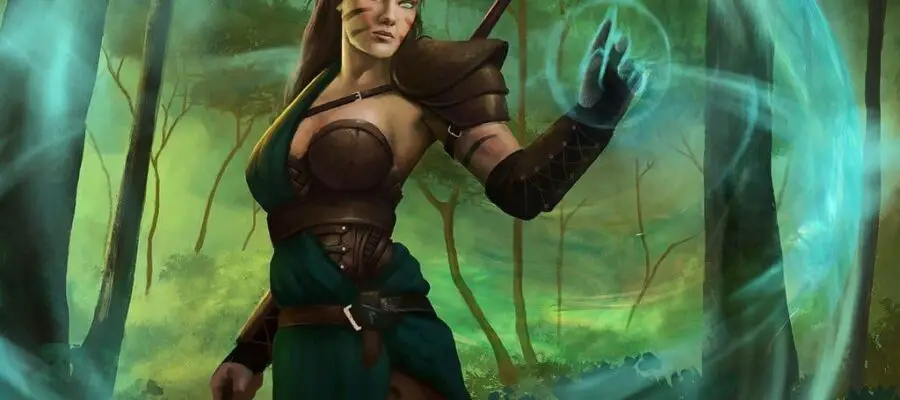“Woodland Warden” by ArtofBenG, CC Attribution-Noncommercial-No Derivative Works 3.0 License
As a player, throwing that death-dealing Flame Arrow that pierces the Lich King’s soul is all that we aspire to do in Dungeons and Dragons, right? There’s no better feeling than being the hero of heroes!
Thematically, maybe it makes sense to be the strangely powerful Druid who overcomes his underdog archetype and rises up to defeat the monster that almost caused a TPK. But I have found that my Druid characters shine brightest as supports. Don’t get me wrong, I also crave being that powerful hero, but focusing less on Damage Per Round and more on kick-butt utility spells is so rewarding.
Here are my top favorite low-level Druid Utility spells.
Thorn Whip (Cantrip)
The ground is crumbling beneath you. A 30-foot crater forms between you and the last drow foe. As he loads a bolt into his crossbow to deal a final blow to one of your weakened companions, you produce a thorny whip, grabbing the drow and pulling him into the crater, throwing him to his doom.
Pros: Not only is Thorn Whip a nice makeshift weapon which has a scalable damage with your level (from 1d6 at level 1 up to 4d6 by level 17), this cantrip has a range of 30 feet, is instantaneous, and can pull your target 10 feet closer to you. Plus, your melee spell attack bonus uses your spellcasting modifier, adding quite a bit to your “roll to hit.” Using this less as a damage dealer and more as a utility spell, the possibilities are endless.
Cons: I really can’t think of any. It’s a cantrip, so you’re not using any spell slots, and it doesn’t require any components that you *shouldn’t* already have in your components pouch. Be creative in your use, and you’ll be pleasantly surprised!
The evil rabid dragon, nearly dead, takes flight above your party and turns invisible, attempting to flee. Acting fast, you cast Faerie Fire 60 feet into the air where you last saw the dragon, illuminating everything in a 20 foot radius—a shimmering blue outline of a dragon is suddenly visible. Your clever rogue shoots his longbow at the dragon, dealing an extra 4d6 of Sneak Attack, bringing the formerly invisible behemoth crashing to the ground.
Pros: Faerie Fire is more than just a useful utility spell for illuminating your target in the dark or making invisible things seen again. Your whole party gets advantage on the target. This doubles the chance of critical hits, AND gives your rogue instant sneak attack! Your damage-dealing companions, who would have been useless in a similar scenario, will THANK you!
Cons: Faerie Fire does require the target to fail a dex saving throw, so there is a chance that the spell fails. Judge your target carefully! Also, this spell requires concentration, like most of the druid spells, and lasts for 1 minute. The duration is GREAT for battles, which usually last less than 10 rounds, but if you need to use your concentration on another spell or if you plan on using this outside of combat, the benefits are slightly outweighed.
Heat Metal (Level 2)
A deranged dwarf locks your party in the dungeons with him, spewing jumbled words that you make out to be “now I’ll never be alone again.” He moves the key toward his mouth to swallow, guaranteeing his promise that you’ll be stuck here forever. Quickly, you cast Heat Metal on the key, burning the dwarf’s hand. He drops the key, your rogue dashes in to grab it, and your party escapes before you’re captured again.
Pros: Heat Metal deals a fair bit of damage upon casting, 2d8, but here’s the cool part: on subsequent turns, if the target can’t or won’t separate himself from the metal object that is being heated, you can use your bonus action to deal more damage! Plus, that creature has disadvantage on attack rolls and ability checks until the start of your next turn each time you deal this damage. Also, this spell has a range of 60 feet, so you don’t even have to be in melee with the target.
Cons: Concentration. Yet again, this spell requires concentration. Not too bad, but can still gunk up your spell-usage if you need to use other concentration spells.
Dispel Magic (Level 3)
Your tank barbarian runs headfirst through a cavern entrance. Runes light up—he has triggered a trap. He drops to the ground, writhing, ugly boils growing on his skin. Unsure what is causing this curse, you cast Dispel Magic. The boils disappear, your barbarian is fine, and you proceed into the dungeon.
Pros: Druids can often double as the “healer” of the party, but some maladies are magically-induced and can only be counteracted by dispelling them. Dispel Magic can be used on a target OR a non-instantaneous magical effect, which opens up its utility to removing buffs from the big bad boss, dispelling charms, unsummoning monsters, and much, much more. Plus, with a range of 120 feet, you’re useful from afar.
Cons: Jeremy Crawford has determined that dispel magic does not work on instantaneous spells, which limits its power slightly. This spell also requires an ability check, which has a chance of failing.
Wind Wall (Level 3)
Your party is resting around a campfire for the night. A strange green fog begins to flow in from the forest, and you notice plant life start to wilt. On the defense, you jump to your feet and cast Wind Wall. You shape the wall around your party and see the green fog hit the wall and bounce away, protecting your resting party.
Pros: The above scenario is an obvious use of Wind Wall, but did you know this spell also deals 3d8 bludgeoning damage to creatures you catch in it? It also protects you from small flying creatures, projectiles like arrows, and has a range of 120 feet!
Cons: This spell requires concentration and only lasts for 1 minute (ten rounds). Also, the 50 feet width you’re allotted for the wall can be too small in some battlemaps, I’ve found.
Conclusion
As gratifying as it is to deal immeasurable damage, it can be even more heroic to act quickly to save the party from effects that fighters, barbarians, and rogues are useless against. To be the only one who can help the party find the monster, or to be the one who protects the party from an unseen force, is rewarding in itself. Plus, you get to hold that over your party’s head whenever they’re useless! Be the fruitful Druid who steps in heroically when things are dire, and you will reap the rewards of a satisfying campaign.




